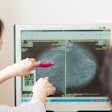
Women are being told they are at high risk of breast cancer from consumer genetic test results which do not take family history into account, say researchers.
This may cause alarm, leading some women to opt unnecessarily for invasive procedures, they warn.
“We’d urge that anyone communicating cancer risk does so based on a detailed family history, not just genetics alone,” said Dr. Leigh Jackson, of the University of Exeter Medical School in Exeter, U.K.
Jackson and colleagues found that women who discover outside of a clinical setting that they carry a disease-causing variant in one of the BRCA genes (BRCA1 or BRCA2) may be told their risk of breast cancer is 60% to 80%.
In fact, the risk could be less than 20% if they do not have a close relative with the condition, according to their study of UK Biobank data, published in the Lancet journal eClinical Medicine.
Jackson said, “Being told you are at high genetic risk of disease can really influence levels of fear of a particular condition and the resulting action you may take. Up to 80% risk of developing breast cancer is very different from 20%.”
While some women may have invasive breast surgery knowing that the risk of developing breast cancer is 20%, “we want them to make an informed decision,” Jackson added.
Many people now pay for home DNA testing kits or are given results while taking part in genetic research without ever having any personal link with breast cancer.
The University of Exeter-led research, funded by the Medical Research Council, sought to establish a clearer picture of the true risk level of BRCA variants in the general population.
Researchers analyzed more than 454,000 participants between the ages of 40 and 69 in the UK Biobank study, which collected DNA samples and asked participants to report illness in themselves as well as parents and siblings.
They found that simply carrying a disease-causing BRCA variant was linked to a breast cancer risk of 18%for BRCA2 and 23% for BRCA1 by age 60. Having a close relative who has had the condition elevated the risk to 24% for BRCA2 and 45% for BRCA1.
The researchers found similar results when looking at genetic risk for Lynch syndrome, a condition which increases the risk of colon cancer and some other cancers.
They said that genetic screening for these conditions in the general population could result in large numbers of people being exposed to needless scans or other procedures.
Co-author Professor Caroline Wright of the University of Exeter Medical School said, “All risk estimates of genetic disease have so far largely been based on relatively high-risk groups who attend specialist clinics, so they will not necessarily translate to the general population. This finding has important ramifications for population screening using genome sequencing.”



















